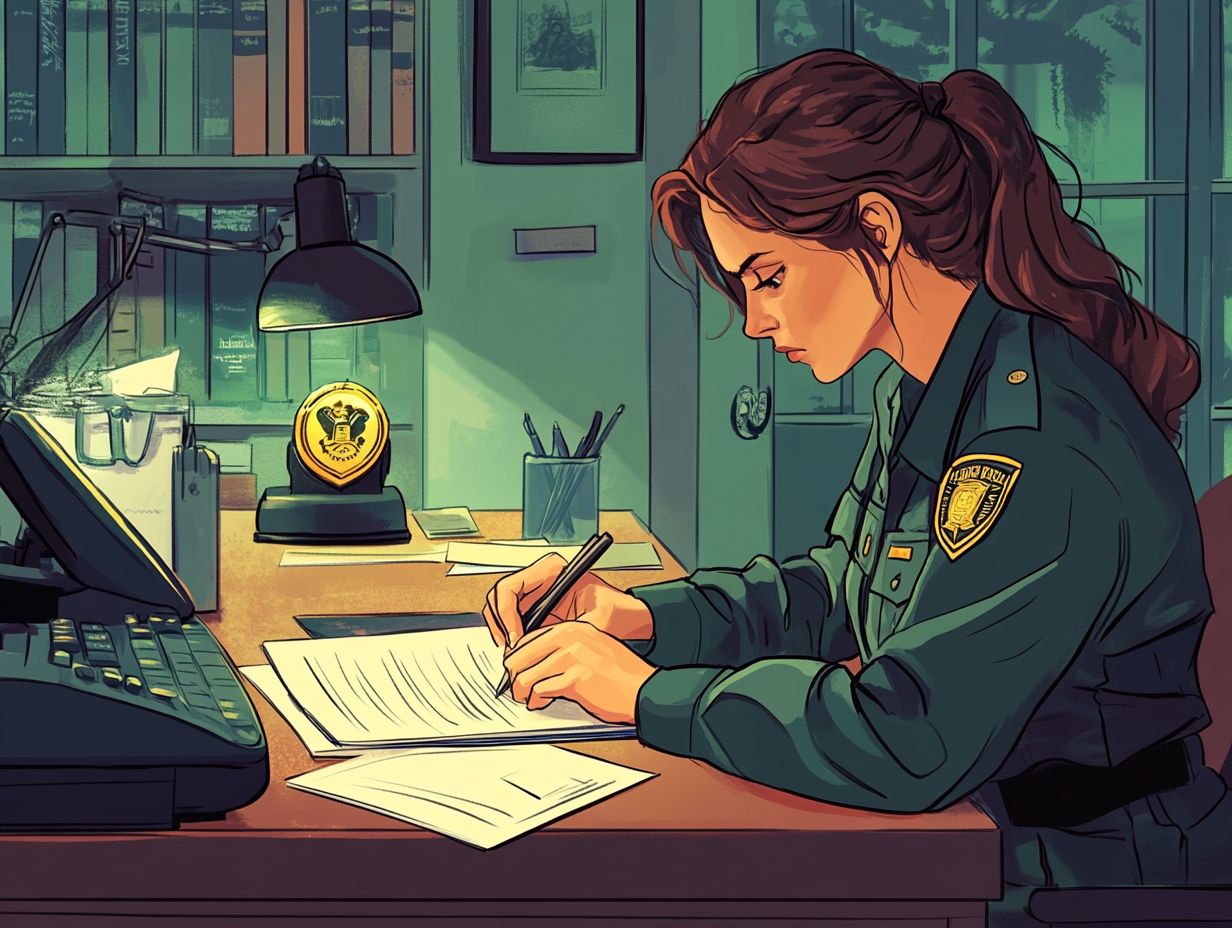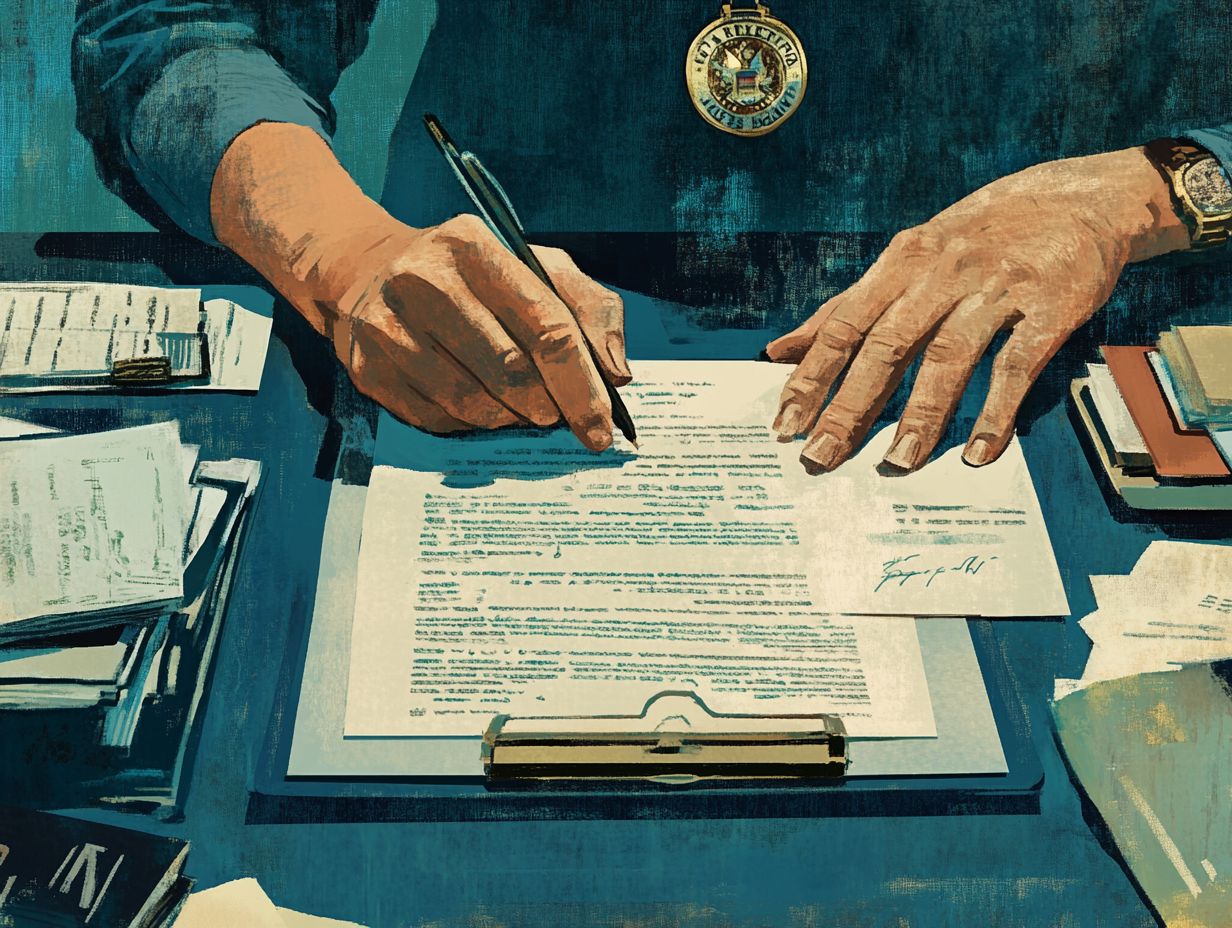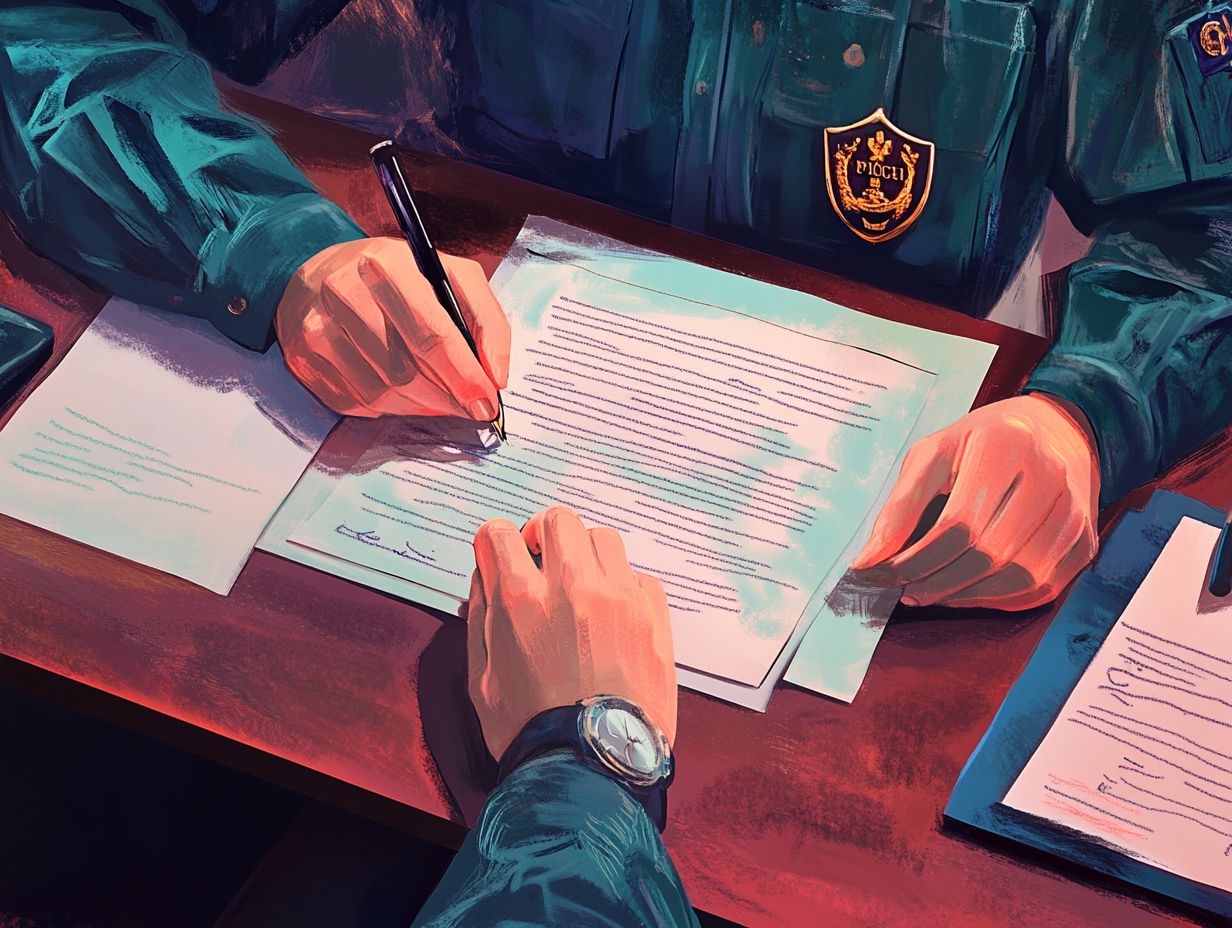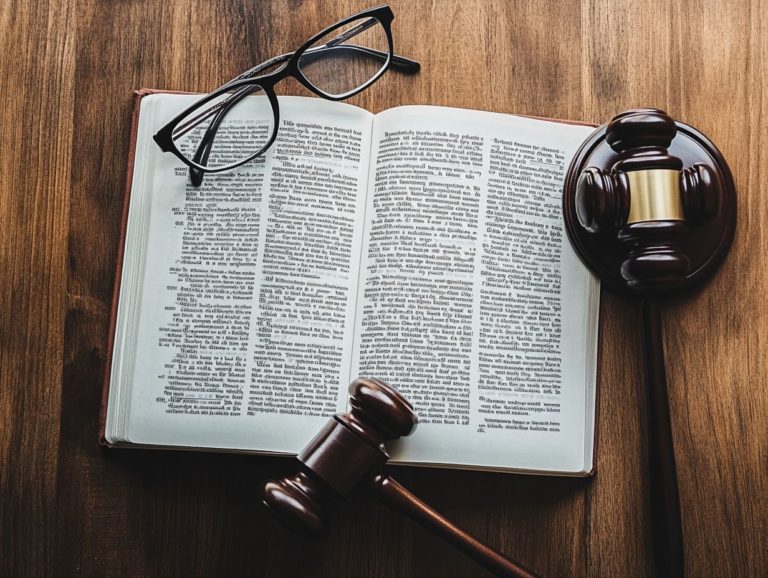How to File a Complaint Against Police Misconduct?
Police misconduct is a critical issue that impacts both communities and individuals. It sparks significant concerns about accountability and justice.
Excessive force and discrimination are forms of misconduct that may differ, but the consequences are often deeply felt.
This guide delves into what qualifies as police misconduct and outlines the various manifestations it can take. It also provides key steps for filing a complaint.
Understanding your rights is essential, and this guide will empower you to navigate these challenges effectively.
Contents
- Key Takeaways:
- Understanding Police Misconduct
- Types of Police Misconduct
- Steps to File a Complaint
- Legal Options for Addressing Police Misconduct
- Frequently Asked Questions
- Can anyone file a complaint against police misconduct?
- How do I file a complaint against police misconduct?
- Is there a time limit for filing a complaint against police misconduct?
- What information do I need to include in my complaint?
- Will my identity be kept confidential when I file a complaint against police misconduct?
- What happens after I file a complaint against police misconduct?
Key Takeaways:

Take action by gathering evidence and documenting the incident before filing a complaint against police misconduct.
Identify the appropriate agency for a formal complaint and seek justice for physical abuse, excessive force, discrimination, or harassment by law enforcement officers.
Consider legal options, such as filing a lawsuit or reporting to external agencies, to address police misconduct and hold officers accountable for their actions.
Understanding Police Misconduct
Understanding police misconduct is essential for upholding civil rights and ensuring accountability within law enforcement agencies.
Police misconduct consists of behaviors by officers that breach legal or ethical standards. This includes excessive force, discrimination, and harassment.
In New York City, the Civilian Complaint Review Board (CCRB) allows citizens to file complaints against police officers.
The involvement of agencies like the Department of Justice highlights the critical need to address these issues within civil enforcement and criminal law.
Defining Police Misconduct
Police misconduct refers to inappropriate actions or behaviors by officers that breach legal standards or ethical norms.
This encompasses unacceptable conduct, such as excessive use of force and racial profiling, which undermine the principles of justice.
When officers exceed their authority, it harms individuals and erodes public trust in law enforcement.
Victims of misconduct often face significant barriers when seeking justice, underscoring the urgent need for robust complaint procedures.
These mechanisms are essential, as they provide a formal avenue for reporting grievances and ensure accountability.
Types of Police Misconduct
Police misconduct can take many forms, including excessive force, discrimination, and harassment. Each erodes the vital trust the public places in law enforcement.
Physical Abuse and Excessive Force
Physical abuse and excessive force are among the most egregious forms of police misconduct. Such actions breach legal standards and ethical lines, leaving victims vulnerable and traumatized.
Excessive force is when police use more physical power than necessary to control a situation. This can include the use of weapons, physical strikes, or undue restraint.
Common examples include beatings, choking, or inappropriate use of tasers in non-threatening situations.
The repercussions extend beyond immediate physical injuries, often leading to lasting psychological effects like PTSD, anxiety, and profound mistrust in law enforcement.
If you are a survivor of police violence, know that various avenues exist for filing complaints, including:
- Internal affairs departments
- Civilian review boards
- Legal actions
These channels aim to ensure accountability and uphold your rights in the face of misconduct.
Discrimination and Harassment

Discrimination and harassment in the realm of police misconduct can profoundly affect both individuals and communities. These actions often break civil rights.
You may encounter these issues in various forms, such as racial profiling, gender-based harassment, and inequitable treatment of marginalized groups.
Such practices erode trust between law enforcement and the communities they serve. They also perpetuate a cycle of fear and resentment.
Laws like the Civil Rights Act protect your rights and offer ways to seek justice.
If you are a victim of police misconduct, you can file complaints with internal affairs or external oversight agencies. This helps pursue accountability and justice for the wrongs you ve endured.
Organizations devoted to civil rights advocacy are often ready to provide support. They can guide you through the complaint process and ensure your voice is heard.
Steps to File a Complaint
Filing a complaint against a police officer for misconduct requires navigating a series of essential steps. These steps ensure that your voice is heard and your rights are safeguarded.
By following this process carefully, you can effectively advocate for accountability and transparency.
Gather Evidence and Document the Incident
To effectively file a complaint about police misconduct, gather evidence and document the incident carefully. This process goes beyond simply collecting witness statements, which offer invaluable firsthand accounts.
You should also utilize photographs and videos that capture key moments. These visual elements vividly illustrate the severity of the situation and serve as an objective record of events.
By compiling this information, you significantly strengthen your complaint and enhance its credibility. Accurate documentation clarifies the circumstances and guides the complaint procedures. This ensures that the relevant authorities have a comprehensive understanding of the issue you’re addressing.
Identify the Appropriate Agency
Identifying the right agency to file your complaint is crucial, as each agency operates within specific areas of authority, known as jurisdictions. Jurisdiction means the area where a police agency has the authority to act.
For example, the Civilian Complaint Review Board (CCRB) handles complaints related to police misconduct in New York City. They offer an independent body for thorough investigations.
On a broader scale, the Department of Justice oversees federal matters, especially in cases that reveal systemic issues or patterns of abuse. Local agencies typically address internal affairs complaints within their respective police departments.
To find the best agency for your complaint, consider factors like the nature of the issue, the region involved, and whether the agency’s focus aligns with the misconduct you’re reporting.
File a Formal Complaint
Filing a formal complaint involves completing a complaint form that captures the specifics of the misconduct incident. This form typically includes essential details such as the date, time, and location of the incident, the names of the involved parties, and a thorough account of what transpired.
It s crucial to be careful in filling out every section. This ensures that the reviewing authority gains a clear understanding of the situation at hand.
Many organizations now provide the convenience of online filing. This allows you to submit your complaint electronically and securely.
After you submit your form, keep an eye on the response timelines. Generally, you can expect to receive an acknowledgment within a specified period. Follow-up procedures may involve interviews or requests for additional information, all aimed at ensuring a comprehensive investigation.
Legal Options for Addressing Police Misconduct

When you encounter police misconduct, you possess a range of legal avenues to address the situation and pursue justice.
You have the power to fight back! You can file a lawsuit or report the misconduct to agencies that can help.
Don t wait! Take action now to protect your rights.
Filing a Lawsuit
Filing a lawsuit is an important legal option for victims of police misconduct seeking compensation and accountability. This decision often marks the first step toward holding law enforcement responsible for their actions.
It s crucial to understand the legal grounds for such a lawsuit. Typically, this involves demonstrating violations of your rights, such as excessive force or unlawful detention.
The potential outcomes can vary widely, ranging from financial compensation to significant policy changes within a police department, affecting not just you but the broader community as well.
Before taking any action, it s wise to seek legal advice. Experienced attorneys can guide you through the complex procedures and timelines of litigation. They ensure that all necessary documents are filed within statutory deadlines and help navigate potential settlement discussions.
Reporting to External Agencies
Reporting incidents of police misconduct to external agencies, like the Department of Justice, elevates accountability and drives systemic change. This process requires you to gather thorough evidence, including documentation, witness accounts, and relevant video footage, to create a comprehensive and persuasive report.
Once you submit your report, these agencies can launch investigations that hold officers accountable and foster broader reforms. Your individual report contributes to a larger database of misconduct claims, revealing patterns that can help tackle systemic issues within law enforcement agencies.
When community members unite to report misconduct, it strengthens the legitimacy of the claims and underscores the urgent need for reform. This collective action presents a united front that becomes increasingly difficult for authorities to ignore.
Frequently Asked Questions
Can anyone file a complaint against police misconduct?
Yes, anyone who has witnessed or experienced police misconduct can file a complaint.
How do I file a complaint against police misconduct?
You can file a complaint by contacting the Internal Affairs division of the police department or through the government’s official complaint process.

Is there a time limit for filing a complaint against police misconduct?
The time limit for filing a complaint varies by location, but it is generally within a few months to a year from the date of the incident.
What information do I need to include in my complaint?
- Date and time of the incident
- Location of the incident
- Names of officers involved
- Any evidence, such as videos or witness statements
Will my identity be kept confidential when I file a complaint against police misconduct?
Most police departments have policies in place to protect the identity of complainants. However, there may be instances where your identity needs to be disclosed for the investigation.
What happens after I file a complaint against police misconduct?
The police department’s Internal Affairs division will conduct an investigation into the complaint. They may interview witnesses, review evidence, and gather other information to determine the validity of the complaint. You will be notified of the outcome of the investigation, which may include disciplinary actions against officers or changes in departmental policies.






